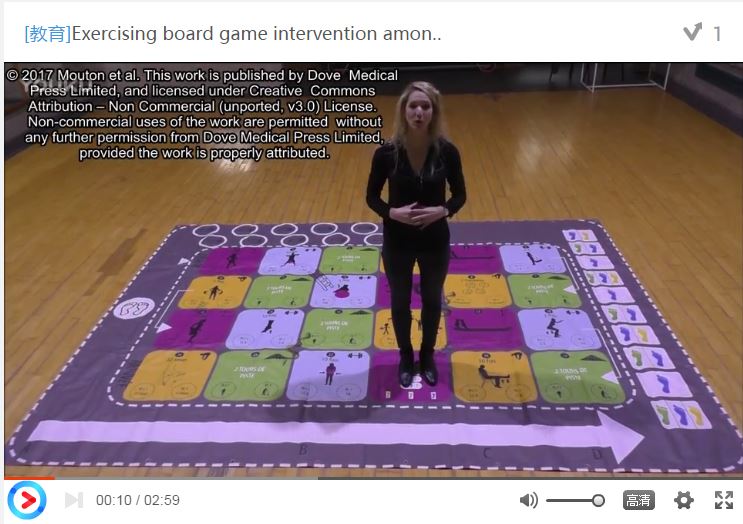9 0 5 7 8
论文已发表
注册即可获取德孚的最新动态
IF 收录期刊
- 2.6 Breast Cancer (Dove Med Press)
- 3.9 Clin Epidemiol
- 3.3 Cancer Manag Res
- 3.9 Infect Drug Resist
- 3.6 Clin Interv Aging
- 4.8 Drug Des Dev Ther
- 2.8 Int J Chronic Obstr
- 8.0 Int J Nanomed
- 2.3 Int J Women's Health
- 3.2 Neuropsych Dis Treat
- 4.0 OncoTargets Ther
- 2.2 Patient Prefer Adher
- 2.8 Ther Clin Risk Manag
- 2.7 J Pain Res
- 3.3 Diabet Metab Synd Ob
- 4.3 Psychol Res Behav Ma
- 3.4 Nat Sci Sleep
- 1.9 Pharmgenomics Pers Med
- 3.5 Risk Manag Healthc Policy
- 4.5 J Inflamm Res
- 2.3 Int J Gen Med
- 4.1 J Hepatocell Carcinoma
- 3.2 J Asthma Allergy
- 2.3 Clin Cosmet Investig Dermatol
- 3.3 J Multidiscip Healthc

Effects of a giant exercising board game intervention on ambulatory physical activity among nursing home residents: a preliminary study
Authors Mouton A, Gillet N, Mouton F, Van Kann D, Bruyère O, Cloes M, Buckinx F
Received 15 February 2017
Accepted for publication 16 March 2017
Published 22 May 2017 Volume 2017:12 Pages 847—858
DOI https://doi.org/10.2147/CIA.S134760
Checked for plagiarism Yes
Review by Single-blind
Peer reviewers approved by Dr Akshita Wason
Peer reviewer comments 2
Editor who approved publication: Dr Richard Walker
Purpose: This study examined the effects of a giant (4×3 m) exercising board game
intervention on ambulatory physical activity (PA) and a broader array of
physical and psychological outcomes among nursing home residents.
Materials and methods: A quasi-experimental longitudinal study was carried
out in two comparable nursing homes. Ten participants (aged 82.5±6.3 and
comprising 6 women) meeting the inclusion criteria took part in the 1-month
intervention in one nursing home, whereas 11 participants (aged 89.9±3.1 with 8
women) were assigned to the control group in the other nursing home. The giant
exercising board game required participants to perform strength, flexibility,
balance and endurance activities. The assistance provided by an exercising
specialist decreased gradually during the intervention in an autonomy-oriented
approach based on the self-determination theory. The following were assessed at
baseline, after the intervention and after a follow-up period of 3 months: PA
(steps/day and energy expenditure/day with ActiGraph), cognitive status (mini
mental state examination), quality of life (EuroQol 5-dimensions), motivation
for PA (Behavioral Regulation in Exercise Questionnaire-2), gait and balance
(Tinetti and Short Physical Performance Battery), functional mobility (timed up
and go), and the muscular isometric strength of the lower limb muscles.
Results and conclusion: In the intervention group, PA increased from 2,921
steps/day at baseline to 3,358 steps/day after the intervention (+14.9%, P =0.04) and 4,083
steps/day (+39.8%, P =0.03) after 3 months. Energy
expenditure/day also increased after the intervention (+110 kcal/day, +6.3%, P =0.01) and after 3
months (+219 kcal/day, +12.3%, P =0.02). Quality of life (P <0.05), balance and gait (P <0.05), and strength of the
ankle (P <0.05) were also improved
after 3 months. Such improvements were not observed in the control group. The
preliminary results are promising but further investigation is required to
confirm and evaluate the long-term effectiveness of PA interventions in nursing
homes.
Keywords: exercise, nursing home, elderly,
ambulatory physical activity, autonomy, game
摘要视频链接:Exercising board game
intervention among nursing home residents
